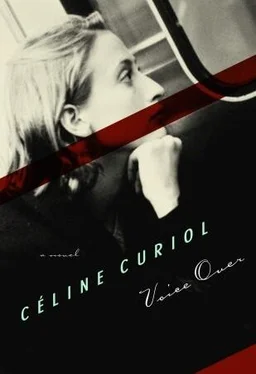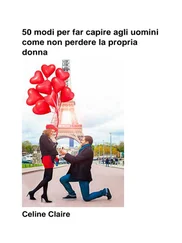Celine Curiol - Voice Over
Здесь есть возможность читать онлайн «Celine Curiol - Voice Over» весь текст электронной книги совершенно бесплатно (целиком полную версию без сокращений). В некоторых случаях можно слушать аудио, скачать через торрент в формате fb2 и присутствует краткое содержание. Год выпуска: 2008, Издательство: Seven Stories Press, Жанр: Современная проза, на английском языке. Описание произведения, (предисловие) а так же отзывы посетителей доступны на портале библиотеки ЛибКат.
- Название:Voice Over
- Автор:
- Издательство:Seven Stories Press
- Жанр:
- Год:2008
- ISBN:нет данных
- Рейтинг книги:5 / 5. Голосов: 1
-
Избранное:Добавить в избранное
- Отзывы:
-
Ваша оценка:
- 100
- 1
- 2
- 3
- 4
- 5
Voice Over: краткое содержание, описание и аннотация
Предлагаем к чтению аннотацию, описание, краткое содержание или предисловие (зависит от того, что написал сам автор книги «Voice Over»). Если вы не нашли необходимую информацию о книге — напишите в комментариях, мы постараемся отыскать её.
Voice Over — читать онлайн бесплатно полную книгу (весь текст) целиком
Ниже представлен текст книги, разбитый по страницам. Система сохранения места последней прочитанной страницы, позволяет с удобством читать онлайн бесплатно книгу «Voice Over», без необходимости каждый раз заново искать на чём Вы остановились. Поставьте закладку, и сможете в любой момент перейти на страницу, на которой закончили чтение.
Интервал:
Закладка:
She doesn’t sit down on the stone benches for fear that he might not see her. She adjusts her hair and tries to act as naturally as she can. Her head jerks round intermittently, as though she keeps feeling that he is watching her, as though he were continually stepping out from some unsuspected corner. She would like to see him so she could pretend not to have seen him. For a moment, she is distracted by the tumultuous stream of pedestrians on the square, wind-up figurines marching in a precise direction, but whose straight-line trajectories seem random. A collision has just been narrowly avoided; barely glancing up, the man and woman continue on their way. The sound of their footsteps is lost amid the din of engines and car horns. A voice rises above the commotion. He is there, behind her, scarcely a metre away. She walks over the moment she recognizes him; she doesn’t dare look him in the eyes. She sees the sides of his jacket flutter. He has just left work. She doesn’t move, leaving him to take the initiative. She feels the coolness of his lips on both her cheeks. He suggests they go for a walk.
Until the Île Saint-Louis, not a word is spoken. She’d like to take advantage of this silence but can’t. Everything is mixed up in her. She thinks she has to talk. To justify their unusual presence in this place, at this hour of the day, the fact that they are together for the first time. To prove to him that he wasn’t wrong to invite her. To keep him there, give him reasons to stay. Because she is worried that he could change his mind at any second and walk off having realized his mistake. She has never been very talkative, but right now her whole brain is refusing to cooperate. It feels as if she is playing Scrabble with herself. Bits of words, the beginnings of phrases form in her head, but she can’t manage to string them together. Her only consolation is to think that perhaps a similar pandemonium is whirling inside him. She doesn’t dare look at him to check. And then, as they turn a street corner, he places a hand on her back. A brief caress, as if to reassure her, as if he had sensed her panic. The contact calms her fears. She knows only one thing now: she is walking by his side.
They have sat down on the banks of the Seine, by the Pont Marie. Not the side where the students show up in the afternoons and where people come to smoke and have fun on summer nights. But the other side, which is quieter. They sit close to each other. She lets her legs dangle over the water, her eyes wandering randomly over the golden buildings in front of her. He sits cross-legged; stealing glances at her out of the corner of his eye. This goes on for an indeterminate length of time. Then he says, how are things? His voice sounds new, as if he had never used this voice before. But the ensuing silence worries her slightly. A giant sightseeing boat is advancing along the river; a mass of tiny tourists are waving their hands. The boat-load, drowning under the didactic onslaught of a nasal voice, holds their attention for a moment before getting sucked into the shadow of the bridge. She leaves her eyes trained on the exact spot where the boat has vanished; he keeps his eyes on her. Then he asks. What are you thinking about? The passage of the boat has given her a little time. She shrugs her shoulders. Nothing. She doesn’t know. About so many things that she doesn’t say. I’ve never seen you look so pretty.
She then has the certainty, the troubling, flattering certainty, that he is about to kiss her. She is dying to let him. Hasn’t she imagined it dozens of times, this kiss that is in no way accidental? And yet something tightens inside her. She is on the edge of a cliff and can’t go any further. After this kiss, there will be no turning back, she will no longer be able to love him in her own little corner without triggering strange defence mechanisms over which she has no control. She has looked forward to this scene for so long, has wanted it more than anything else. But now she puts off doing what she has yearned for all these months. His wanting to kiss her turns into a threat, and his desire feels like a weapon that could only wound her. A frightening reflex that she is powerless to stop. She feels ridiculous, at a loss. The spell is broken. Taking hold of her hand, he gives it a squeeze; she squeezes his back. She wishes she could stay like that, but she can’t stop herself from erecting a barrier of words between them. We should be going. Another tourist boat is passing along the river, in the wake of the one before it. At first glance, its passengers look the same as the ones before.
They walk back over the Pont Marie. He must be telling himself that he made a mistake, that her behaving like a jumpy teenager doesn’t make any sense. He must not understand what she wants from him any more and must be thinking about Ange. He’ll be able to tell her the truth: nothing happened, I held her hand, she wasn’t feeling well, you know, she tends to be fairly unpredictable. And yet the story about the prostitute had made an impression on him. For the first time, he had realized that she wasn’t the bland woman he had taken her to be. In front of city hall, he must have watched her for a few minutes before calling her name. Her hidden, darting looks, her hesitations, her air of being present and yet absent, as if her body were translucent. People find it annoying, she knows that. And yet he had seemed to put up with it, at least until now. He can’t ever have met anyone like her, surely that is what attracts him. In her awkwardness and abrupt way of asserting herself, he must recognize something of himself. And afterwards? How could he deal with her spontaneous reactions? How can he even consider getting involved with her? And risk upsetting a life which, when all is said and done, must suit him just fine. Keep Ange at a distance, risk hurting her or living with a guilty conscience. And all that for a woman who recoils before he has even offered her his lips. If kissing is already such a trial, no wonder he loses heart and doesn’t want to imagine anything further between them! I’ll walk you back. He spoke in a flat voice. An immense traffic jam has brought the Rue de Rivoli to a halt.
He steps away, and she doesn’t have it in her to hold on to him. Too little time, too little intimacy. In less than an hour, she has ruined everything. First prize for disappointment, the clear winner. She should have known that she wouldn’t be up to the task. And yet she thought she had prepared herself. Tell him that there are good reasons to justify her behavior but that she doesn’t know how to explain them. A whole string of insults come to mind — opportunist, nasty coward, cheap asshole, pickup artist. But using them against him wouldn’t help her case. If he thinks he’s easy to get close to, if only he knew how much patience she’s needed. He must be comparing her to Ange and, it goes without saying, she doesn’t stand a chance. She would like to tell him that he shouldn’t think like that. Ange is Ange; she has her wings, she knows how to fly, light and charming. She, on the other hand, has no wings. She has a voice which she uses correctly only when addressing strangers. She has never asked to take Ange’s place. She has never asked for anything. Besides, it was he who phoned her. She isn’t even sure what she wants. If only she could be certain that he was like the others, she would know how to back off and leave him alone. But she thinks of him in a way that she has never thought of anyone else before.
They walk down into the métro. Music is coming up from below. You hear it? He nods. At the bottom of the steps, a rolypoly little man is sitting at a miniature keyboard. His thick fingers pound the keys of the instrument, which emits more or less harmonious metallic squeaks. They pause to watch the unusual spectacle. She recognizes the piece: Für Elise. E — D—E — D—E — B—D — C—A — C—E — A—B, with a rock beat. She used to play it and always detested it. Just then, he takes hold of her arm and turns her towards him. She senses that he wants to say something serious to her. But the sight of him standing in front of her like that, embarrassed, with that awful music in the background as the little man presses on, improvising some grotesque tune, gives her a fit of giggles. Taken aback, he lets go of her. His arms drop to his sides. Again an unexpected turn. Do I make you laugh? She shakes her head, as if trying to get rid of the silly idea that has wormed its way into her. Explain before he takes offence and gives up on her for good. It’s the piano, I used to play it when I was little. He doesn’t understand. He looks at the little man, who is more pathetic than funny. He no longer feels desire for her, she can sense it; he no longer knows the reasons that prompted him to come for her. You ought to go, Ange will be waiting. She spoke without hostility or bitterness, with an assurance that stood in stark contrast to her retreat just moments earlier. Soon, they will have put an end to this shaky adventure, which they wrongly believed they had wanted to embark on. And suddenly she thinks she knows what he wants to say to her: Ange is the one I love. Ange’s beauty, her assurance, her straightforwardness, and he would compromise his relationship with such a woman! All she can ever be for him is a fantasy, a solitary, bewildered creature who arouses his curiosity. It was out of pity that he arranged to meet her, at once flattered and sensing a responsibility for the interest she showed in him. He confused his willingness to do something for her with some amorous feeling.
Читать дальшеИнтервал:
Закладка:
Похожие книги на «Voice Over»
Представляем Вашему вниманию похожие книги на «Voice Over» списком для выбора. Мы отобрали схожую по названию и смыслу литературу в надежде предоставить читателям больше вариантов отыскать новые, интересные, ещё непрочитанные произведения.
Обсуждение, отзывы о книге «Voice Over» и просто собственные мнения читателей. Оставьте ваши комментарии, напишите, что Вы думаете о произведении, его смысле или главных героях. Укажите что конкретно понравилось, а что нет, и почему Вы так считаете.












